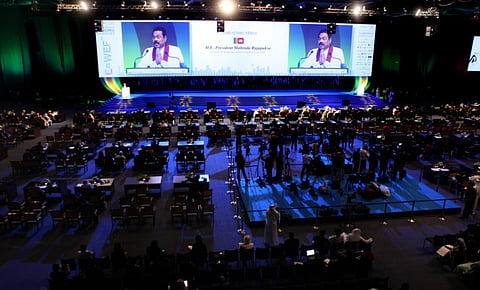Developing nations blame problems on first world
Developed countries "not doing enough" for energy efficiency and renewable energy

Dubai: Leaders of developing countries have launched a veiled attack against the developed countries for “not doing enough” for energy efficiency, sustainability and promoting renewable energy.
They laid the blame for the current level of the greenhouse emissions and environment degradation solely on developed nations.
“The paths undertaken by the developed countries during the days of their economic and industrial development, were not environmentally sustainable, and in some case, unethical and mostly harmful. Today we all carry the burden of their past activities,” Mahindra Rajapaksa, President of Sri Lanka, said in his speech at the World Energy Forum on Monday.
“Today, rising Asian countries that are leading global development are pulling more people out of poverty than anyone in the past.”
Praising the Dubai government for its green energy policy, Esmail Omar Guelleh, President of Djibouti, said energy has long been neglected by the developed world.
Africa, home to a billion people, 15 per cent of the world’s population, represents only 3 per cent of global trade and 3 per cent of global power consumption.
“Per capita electricity consumption in Africa is about 60 kilowatt hours (KWh), compared to 8,000KWh in the US. For us – the people in Africa – this is a matter of survival,” he said.
Blaming the West for not doing enough to promote green and sustainable energy, Omar Guelleh, said, due to this, “the black continent remains in darkness. Half of Djibouti’s population does not have access to electricity today. However, renewable energy could help alleviate poverty.”
However, both leaders said this is not the time to engage in a blame game, but to work hard to diversify the global energy mix.
“Today we should not blame each other but undertake actions to develop sustainable energy in an equitable manner,” Rajapaksa said.
Giving a lowdown of power consumption and the challenges faced by Sri Lanka in ensuring uninterrupted power supply, he said a quarter of the country’s national income is spent on importing fossil fuel to power homes while hydropower, formerly the main power source, has declined to 30 per cent from 95 per cent in 1995.
“For a country that does not produce oil, it is a huge burden. That’s why we created a sustainable energy authority in 2007 to develop a new policy that will help us to reduce dependence on fossil fuel. We have set a target to generate 10 per cent of our power from renewable energy,” Rajapaksa said.
However, he cautioned against using agricultural land and output for energy – that would deprive the world’s poor of food.
“The policy imbalance that do not address these issues will not be accepted by the people,” he warned.
Omar Guelleh, meanwhile, shared his government’s plan to attain self reliance in power and utilities by investing in renewable energy. He said his country is developing a 1 gigawatt (GW) geo-thermal power plant that will be commissioned by 2018 and a 20GW solar power plant by 2020.
“By 2020, our country will become a complete green energy producer, and the first country in Africa to do so,” he said.



